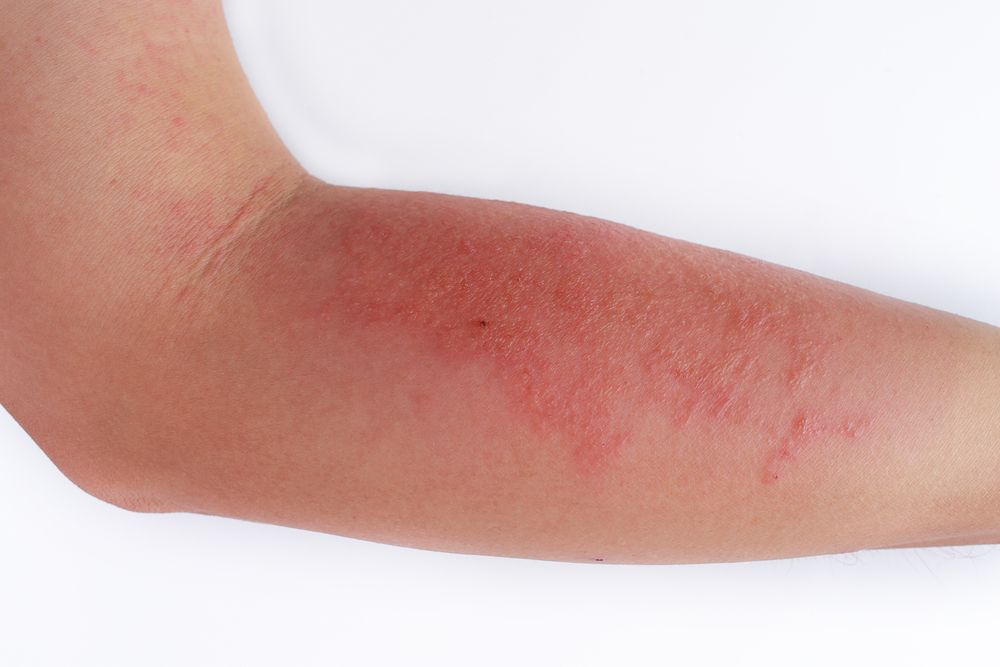- Case-Based Roundtable
- General Dermatology
- Eczema
- Chronic Hand Eczema
- Alopecia
- Aesthetics
- Vitiligo
- COVID-19
- Actinic Keratosis
- Precision Medicine and Biologics
- Rare Disease
- Wound Care
- Rosacea
- Psoriasis
- Psoriatic Arthritis
- Atopic Dermatitis
- Melasma
- NP and PA
- Skin Cancer
- Hidradenitis Suppurativa
- Drug Watch
- Pigmentary Disorders
- Acne
- Pediatric Dermatology
- Practice Management
- Prurigo Nodularis
- Buy-and-Bill
Article
Systemic agents fall short for atopic dermatitis patients
Author(s):
Adult atopic dermatitis patients with moderate-to-severe disease who were treated with systemic agents reported a high level of disease-related burden despite those treatments, says a recent study.
“[The study] shows that the standard of care with currently available topical, oral systemic and photo-therapies is clearly inadequate and that there is a need to improve control of atopic dermatitis in the United States,” says Jonathan I. Silverberg, M.D., Ph.D., M.P.H. (©TYLim/Shutterstock.com)

Dr. Silverberg

Adult atopic dermatitis patients with moderate-to-severe disease who were treated with systemic agents, including cyclosporine, azathioprine, mycophenolate mofetil, methotrexate or cyclophosphamide, reported a high level of disease-related burden despite those treatments, according to research published July 17, 2019 in the Annals of Allergy, Asthma and Immunology.
NEW: Atopic dermatitis drugs in development
They not only reported severe disease symptoms, but also recurrent flares, impaired quality of life, reduced work productivity and compromised daily activities.
“The study period was prior to the availability of dupilumab in moderate-to-severe atopic dermatitis. However, it shows that the standard of care with currently available topical, oral systemic and photo-therapies is clearly inadequate and that there is a need to improve control of atopic dermatitis in the United States,” says the study’s senior author Jonathan I. Silverberg, M.D., Ph.D., M.P.H., associate professor of dermatology, medical sciences and preventive medicine at the Feinberg School of Medicine, Northwestern University, Chicago.
Researchers conducted a longitudinal, prospective, observational study of atopic dermatitis patients who had been diagnosed in the last five years and had been prescribed systemic immunosuppressants, systemic corticosteroids or phototherapy. Participants completed a baseline paper survey, followed by web-based surveys at 3, 6, 9, and 12 months, as well as shorter monthly web-based surveys in between.
RELATED: The optimal management of itch
Of the 801 adult participants analyzed, more than 66% said they had been diagnosed at 21 years or older.
“While 66% is a little on the high side, it is important to note that adult-onset atopic dermatitis is more common than many clinicians recognize. A recent meta-analysis found that approximately 1 in 4 adults with atopic dermatitis report adult onset of their disease,” Dr. Silverberg tells Dermatology Times.
RELATED: Desire for clearance high in atopic dermatitis patients
More than 26% of adults reported having severe atopic dermatitis.
Most participants, 63.6%, reported using topical corticosteroids in the last month, while 11.4% used systemic corticosteroids and 5.1% had used systemic immunosuppressants in the last month, according to the 12 months prior to the baseline survey.
More than 81% of patients indicated they had experienced at least 1 flare over the past month, according to the baseline monthly data.
RELATED: Diagnosing adult-onset atopic dermatitis
“Regardless of baseline [atopic dermatitis] severity, and despite having received systemic agents in the past 6 months, a significant proportion of patients (38.3%) had not experienced remission in the prior 12 months,” the authors write.
Data from the Patient-Oriented Eczema Measure (POEM), a 7-item measure of symptom frequency in the past week, revealed that 57.6% of participants reported moderate to very severe symptoms in the short term. More than 34% of patients indicated they experienced 1 to 4 days of disrupted sleep in the last week. Severe atopic dermatitis patients fared worse in those two outcomes.
Nearly 44% indicated that atopic dermatitis moderately to extremely impacted their quality of life. The effect was worse when patients were experiencing flares, more frequent flares or severe disease.
Nearly 79% of working participants reported missing work due to atopic dermatitis an average 7.1 hours in the last 7 days.
“Despite using systemic treatments, patients with severe and currently flaring AD were similarly dissatisfied with the medications that they were taking for their [atopic dermatitis] …,” according to the authors. “These results suggest that patients with [atopic dermatitis] have significant unmet therapeutic needs.”
READ MORE: Stories on atopic dermatitis
References:
Wei W, Ghorayeb E, Andria M, et al. A real-world study evaluating adeQUacy of Existing Systemic Treatments for patients with moderate-to-severe Atopic Dermatitis (QUEST-AD): Baseline treatment patterns and unmet needs assessment. Ann Allergy Asthma Immunol. 2019;123(4):381-388.e2.





